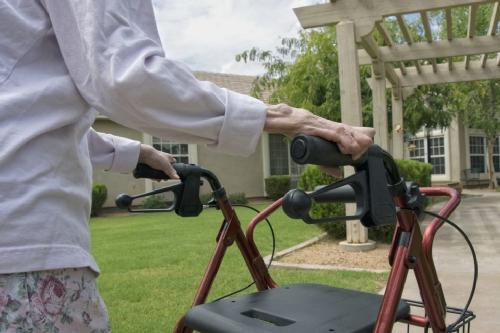
Power of Attorney for Your Elderly Loved One – A Basic Guide
As a parent or relative ages, it can become a struggle to balance respect for his/her autonomy and independence while protecting them from negative consequences of mental or physical health problems. A Power of Attorney (POA) is one way to ensure that no matter what happens down the road, your loved one's wishes will be prioritized.
A POA is one of the most important documents for elderly parents and grandparents, but it's one that many families haven't prepared. Fortunately, setting up a power of attorney is fairly simple, and it can save you from future complications. Executing a power of attorney is an important step to take sooner than later, even if your aging loved one is still physically and cognitively healthy.
Following is information about the different types of power of attorney, common reasons seniors need them, and how to have a POA executed for your aging relative.
A power of attorney is a document signed by a competent adult called "the principal," granting a trusted individual the power to make decisions on their behalf if the principal cannot do so. The person designated to act in the principal's best interest is called "the agent." It's the agent's job to make sure the principal, in this case, their aging parent or loved one, is well-cared for.
Most seniors will execute multiple varieties of POA. An elder law attorney can help your aging relative determine the right combination for their needs.
General Power of Attorney
A general power of attorney is comprehensive it gives a senior's agent power to act on their behalf financially and legally. General power of attorney can be used for healthy parents who want help with financial or personal matters.
- Their POA is sometimes called a financial power of attorney. It gives an agent power to:
- Sign documents on the senior's behalf
- Open or close bank accounts, and withdraw funds
- Buy and sell property, real estate, and assets
- Trade and sell stock
- Pay bills and cash checks on the principal's behalf
- Enter contracts for utilities and services like housekeeping or home health
Medical Power of Attorney
A medical power of attorney, also known as a healthcare proxy or healthcare agent, is someone who makes healthcare decisions for the principal if they're incapacitated. It's their job to ensure a senior's wishes, as stated in their advanced directive or living will, are upheld in case of end-of-life care.
A medical POA only goes into effect when a senior is deemed incapacitated. The agent named is responsible for ensuring health providers follow instructions from the senior's medical power of attorney documents. They also have authority over:
- Medical treatment
- Surgical procedures
- Feeding tubes and artificial hydration
- Organ donation
- Selection of health care or senior living facilities
- Release of medical records
Durable Power of Attorney
A durable power of attorney allows the agent to make financial and medical decisions through all mental and physical circumstances unless the principal chooses to revoke it.
Even if the senior is in a coma, has experienced a significant cognitive decline from dementia, or is otherwise deemed incapacitated, a durable power of attorney allows the agent to make decisions on their behalf. A non-durable power of attorney is void if the principal becomes mentally incapacitated, so it's not recommended for dementia patients or seniors at risk of dementia.
Limited (Special) Power of Attorney
A limited power of attorney is exactly what it sounds like a senior can give someone agency for a limited amount of time, which is generally stipulated in the document. For instance, a limited power of attorney could go into effect for a specific business transaction, like a real estate sale.
Springing Power of Attorney
A springing power of attorney is executed in advance but doesn't go into effect until a senior receives a declaration of incapacity. Seniors who want to maintain autonomy as long as possible may prefer a springing power of attorney. However, this decision could lead to complications and delays down the road. Medical evaluations related to determining incompetence can be costly and time-consuming and are subject to legal conflicts.
Six Common Reasons for Seniors to Consider a Power of Attorney
A POA grants a chosen relative or friend the ability to make decisions when a parent or grandparent is either unwilling or unable. Here are a few reasons seniors may feel it's time to set up a power of attorney:
Financial responsibilities
If your aging relative has a hard time staying on top of financial obligations or is in danger of overspending their savings, it may be time to establish a financial power of attorney. Check for overdue bills, duplicate checks, and fraudulent requests for funds.
Alzheimer's disease
It's vital to set up a durable power of attorney for an elderly parent with dementia before they experience significant cognitive decline since it can be complicated to execute legal documents once a senior is deemed mentally incapacitated.
Upcoming surgery
Invasive surgeries can lead to complications. A power of attorney ensures that a senior's wishes will be respected in case of emergency.
Planned travel
Sometimes, a POA is established out of convenience, rather than medical necessity. If seniors are traveling in retirement, they may want someone at home able to cash incoming checks and handle bills.
Medical diagnosis
A senior with a terminal diagnosis may want to establish a power of attorney to ensure their wishes are met when they become incapacitated or too sick to make health care decisions.
Unstable family relationships
It's common for adult children to fight about a parent's care, especially if they disagree about finances or end-of-life decisions. A power of attorney clearly designates who's responsible for upholding the senior's wishes and can block ill-intentioned family members from intervening.
How to select a power of attorney for an elderly relative
Choosing an agent is often one of the most time-consuming parts of the process, since it's important for seniors to ensure their best interests. To follow are five questions to consider when selecting an agent for a senior's power of attorney:
Is a family member the best choice?
Many seniors select a relative as POA by default. There can be instances whereby this may not be the best choice if family relationships are strained. And advisor, close friend, or professional proxy can all be safe alternatives.
Is there a knowledgeable option?
Someone familiar with medical procedures and treatments may be able to make better decisions as medical power of attorney. Someone with experience in accounting would be an ideal financial or general power of attorney.
Should power of attorney be split?
A senior can choose one agent for general power of attorney and another for medical power of attorney. Or, they can choose multiple agents for both. If there are multiple agents who disagree, decisions could be delayed, however.
Will the agent be able to carry out the senior's wishes?
The top responsibility of a POA is to comply with the senior's directives. Sometimes, this is emotionally difficult. For example, a spouse may struggle with making the decision to end life support, even if it's what their partner wanted.
Who does the senior trust?
A power of attorney agent should always put the needs and well-being of the senior first, no matter their own circumstances. Trust is imperative when selecting an agent.
Sometimes, adult children can feel hurt or jealous knowing their parent has named a sibling as POA. A family elder care planning meeting can be a forum to discuss choices and help people begin to accept them.
When and how should a senior set up a power of attorney?
A senior's wishes may not be known or respected without legal documentation, so discussing power of attorney with aging relatives is important.
Now is the time to talk about a POA. Experts recommend establishing a power of attorney for elderly parents before they need it, especially if they've received a concerning diagnosis. Patients diagnosed with early-stage dementia should set up a power of attorney before the disease progresses. If an aging relative is determined no longer competent to make their own decisions and doesn't have a POA, family members face a complicated, expensive legal process to set up a conservatorship or guardianship.
Contact an elder law attorney. While many do-it-yourself power of attorney forms are available, having a lawyer draft one tailored to your family's needs is a good idea. There are many issues to consider, and one size doesn't fit all. To follow, are four common scenarios an elder law attorney can help address:
Springing power of attorney. If the power of attorney is springing, it's important that the method for determining incapacity is clearly spelled out in the document. Otherwise, the need to determine incapacity can cause delays and extra expenses.
Appointing a guardian. Usually, if guardianship proceedings become necessary, the court will appoint a guardian for a senior. However, if a lawyer has nominated a guardian in the durable power of attorney, the court will usually honor that nomination.
Executing the power of attorney. Requirements for power of attorney differ between states. A local estate planning attorney or elder law attorney can ensure that the POA is executed properly.
Bank acceptance. Due to potential legal consequences, some banks and other institutions are hesitant to accept a power of attorney, even if it's executed correctly. Banks may have their own standard power of attorney forms for you to sign. An elder law attorney can ensure any documents you sign with a bank match the original power of attorney.

Related Articles

What is Alzheimer's and How to Help People with It

Redirecting a Loved One With Dementia

Assessing Your Loved One’s Ability to Complete Activities of Daily Living

Dealing with Sleep Problems and Dementia

Holiday Gifts for Loved Ones in Senior Living

How to Tell Family Members That Mom or Dad Have Alzheimer's Disease

Communicating With A Loved One Who Has Dementia

